It's been a while, hasn't it? Something about the summer just pulled me away from the Grimm and into the poetry. But with the chill in the fall air and the change of light it felt like time to reenter the forests. I almost wanted to ignore this chestnut altogether. The story has been told and retold and, really, it isn't that good in my opinion. But I remembered once in a drawing class we
Viewing: Blog Posts Tagged with: grimmoire, Most Recent at Top [Help]
Results 1 - 21 of 21
Blog: The Excelsior File (Login to Add to MyJacketFlap)
JacketFlap tags: greed, fairy tales, parents, grimmoire, brothers grimm, ghosts, Add a tag
Blog: artista how to (Login to Add to MyJacketFlap)
JacketFlap tags: inspire me thursday, walltowall, inspire me thursday, walltowall, Add a tag
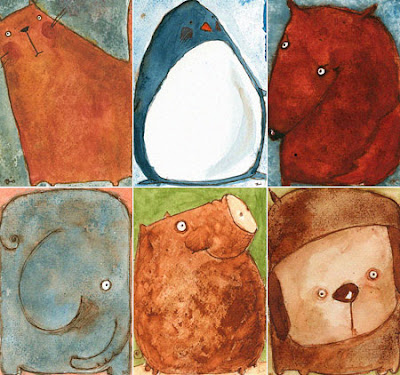
I have a series of postcard with wall-to-wall animals on.
Képeslap sorozat faltólfalig állatokkal.
Blog: The Excelsior File (Login to Add to MyJacketFlap)
JacketFlap tags: grimmoire, brothers grimm, Add a tag
Sadly, not another story of inanimate objects, but another one of those where the brothers set out to seek their fortune and the one who settles for less ends up with more. The first brother finds a mountain of gold, hacks out as much as he can carry, then heads home to buy his happiness. The second brother finds a mountain of silver and does the same. Surely the third brother is going to find
Blog: The Excelsior File (Login to Add to MyJacketFlap)
JacketFlap tags: grimmoire, brothers grimm, Add a tag
Overrated. Overexposed. Over. Except to note... Snow White is not awakened by a kiss. I have long known the original ending, where the prince has bought her glass coffin from the dwarfs because he must possess such beauty (uh, yuk!) and then while transporting her to his princely lair drops the casket wherein the piece of poison apple lodged in her throat pops out and she awakens. That's how
Blog: The Excelsior File (Login to Add to MyJacketFlap)
JacketFlap tags: princess, gender, disney, grimmoire, brothers grimm, roles, Add a tag
Alternately known as Princess Comeuppance. Another story of another snotty little princess who learns her lesson the hard way. You would think that with so many stories of snotty princesses that girls wouldn't be so actively engaged in separating their parents from their disposable income. What's that you say? Oh, right: the Disney Factor. I keep forgetting. So the princess is walking the
Blog: The Excelsior File (Login to Add to MyJacketFlap)
JacketFlap tags: grimmoire, brothers grimm, Add a tag
Rules of the Grimmoire Forest: 1. A Forester is not only a worthy occupation, it also provides enough income to afford a man a cook and servants for his house. 2. Children found in trees may be taken home and freely raised as they become your property on sight. 3. When two children have bonded as sibling, whether blood relation or not, a simple child-like incantation is enough not only to
Blog: The Excelsior File (Login to Add to MyJacketFlap)
JacketFlap tags: dog, wolf, grimmoire, brothers grimm, sultan, Add a tag
This one starts out sounding as dark as any middle-grade dog story but lightens up at the end in typical Grimm fashion. Old Sultan is a dog, a toothless wonder who has outlived his days, is slated to be taken out into the fields and shot the next day by the farmer. Overhearing this to dog trots off to the forest to whine to his cousin, a wolf. The wolf has an idea: the next day the wolf will
Blog: The Excelsior File (Login to Add to MyJacketFlap)
JacketFlap tags: grimmoire, brothers grimm, dumb, Add a tag
 I'm just going to call this one Dumb As a Stump.
I'm just going to call this one Dumb As a Stump.
A girl is told to stay away from Mother Trudy.
But the girl goes to visit Frau Trude anyway to find out what all the fuss is about. When she reaches Mother Trudy's door she is ashen as she meets the old woman. When asked to explain what is troubling her the girl says she has seen a black man on her stairs. Mother Trudy insists it was just an old coal burner. A green man is waved off as a huntsman, a blood red man is merely a butcher and then, just before the girl knocked on Mother Trudy's door, she saw the Devil through the window prancing around.
The jig is up. Mother Trudy turns the girl into a block of wood and tosses her into the fire.
"That really does give off a bright light," Frau Trude remarks. Dim in life, bright in death, dumb as a stump.
I will say this, as cautionary tales go it's at least short and to the point. If you are told to stay away from the old witch, then stay away. I am a little curious as to why, if the people knew that Mother Trudy was as bad as all that why they just didn't tell our dim little star that the Devil lived in the house. Would she have been equally curious? After all, having seen the Devil through the window she continued on to knock on the door.
Unless her family wanted her to go visit Mother Trudy, knowing that her curiosity would get the better of her. Seems a bit harsh as population control
Blog: The Excelsior File (Login to Add to MyJacketFlap)
JacketFlap tags: grimmoire, brothers grimm, Add a tag
Finally, the origin of the Agatha Christie they-all-did-it murder mystery.
Here we have another one of those stories where the animals and inanimate objects are all hanging out together. This time the Rooster and his Hen are riding in a coach and they pick up the following hitchhikers: A Cat, an Egg, a Millstone, a Duck, a Pin and a Sewing Needle. Herr Korbes house is apparently their final destination and when they arrive he is not in so they settle themselves in around the house.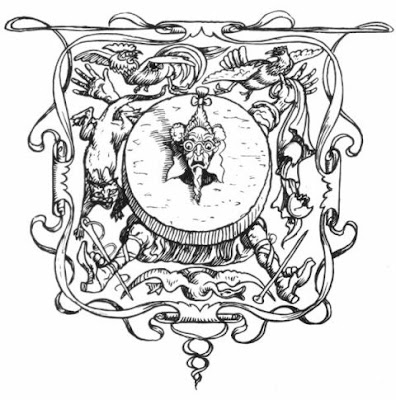
As with "Riffraff" the interlopers settle in around the house and when Herr Korbes arrives gets ashes tossed in his face by the Cat, the Egg glues his eyes shut, the Duck splashes water in his face, the Pin gives him a stick in the posterior, the Sewing Needle gives him a poke in the head and just to make it all final the Millstone (who had been napping above the doorway) lands on him, crushing him flat. There is no mention of the Hen and the Rooster who I assume hightailed it out of there before they could get blamed for anything.
In checking out the internets for some relevant images I found a Spanish translation of the text that appeared to have a moral attached to the end of it.
Antes de hacer algún movimiento, es prudente observar antes cómo está todo alrededor.
Which roughly means: Before making a move it is prudent to observe ones surroundings. Odd, since the Grimm story ends with "Herr Korbes must have been a very wicked man." suggesting an entirely different moral.
Moral: Lock your doors if you're prone to animals and inanimate objects as house guests.
Blog: The Excelsior File (Login to Add to MyJacketFlap)
JacketFlap tags: horror, grimmoire, brothers grimm, Add a tag
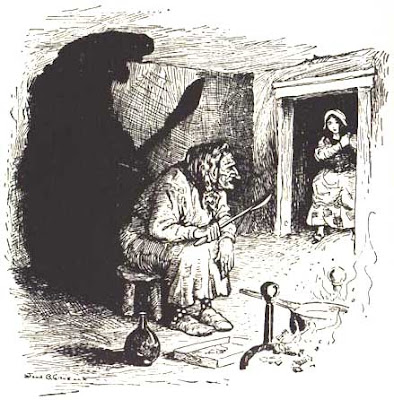 This is one of those titles that feels familiar. A little research and there's a Eudora Welty novel of the same name from 1942 based on the Grimm tale, and a Broadway musical based on the book from the mid 1970's. And the plot summaries are nothing at all like the Grimm tale.
This is one of those titles that feels familiar. A little research and there's a Eudora Welty novel of the same name from 1942 based on the Grimm tale, and a Broadway musical based on the book from the mid 1970's. And the plot summaries are nothing at all like the Grimm tale.
Part campfire story, part Sweeney Todd, the story takes some of the more familiar Grimm elements (good girl, disingenuous suitor, talking birds, trail of food to find one's way home) and puts some grisly twists in for good measure.
A miller has a beautiful daughter whom he intends to marry off to the best suitor he can find. Having found one and agreed on the marriage the wedding date is set. The daughter, with no say in the matter, is skeeved out by the guy, though she nor anyone else can figure out why. She avoids her hubby-to-be as much as possible and with the wedding drawing near he insists she come visit him at his little place in the country.
She leaves a trail of peas and lentils as she makes her way into the woods. Upon finding the house she lets herself in and finds it mostly empty, save for a caged bird that sings out a warning that this is a house of robbers and she should leave. But does she?
A quick aside here: I've noticed that when robbers are mentioned in Grimm tales they tend to be something a little more serious than burglars or the stand-and-deliver highwaymen I tend to associate with stories from this era. When the Brothers Grimm say robber it might be best to substitute and assume the word sociopath or psychopath, depending on the nature of their intent. For our purposes here, the bridegroom may be a bit of both.Exploring the house further she finds room after empty room until letting herself down into the basement where an old crone is tending a fire. The woman reiterates the bird's warning, that this is a den of robbers, and that if she stays any longer they will be home and will eat her. Too late, the robbers (the girl's future husband among them) return home with another young woman. The girl hides behind a barrel in the corner and stays hidden in fright as the men give their current catch three glasses of wine (one white, one red and one yellow) which has the effect of killing her, making me wonder just exactly what kind of wine they're talking about. Once dead, the men proceed to hack her up and prepare her for the old woman to make into a stew. One of the robbers eyes a ring on the dead girl's finger and, unable to remove it, hacks the finger off with an axe. The finger flies across the room and lands in the lap of the terrified girl behind the barrel. Quickly thinking, the old woman diverts their attention from the finger ("It'll still be there in the morning!") and proceeds to drug them with wine so they pass out. When the coast is clear the old woman helps the girl escape, using this opportunity to finally break whatever servitude she herself had with the robbers.
Back home the daughter tells her father all, which not only shocks him but underscores what a bad judge of character he is. So the wedding goes as planned, with all parties invited and attending. The bridegroom is miffed that she didn't come to his house as arranged, but no matter, they can go there after the wedding. Folks gathered around the table are telling stories and the girl is implored to tell one herself. She tells of a dream, of a house in the forest, with a bird that sings out warnings, and a crone in the basement. The story is very solemn for so happy an occasion and she keeps reassuring her breidegroom "It was only a dream." Except, at the very end, when she gets to the point of the murdered maiden and her finger flying across the room, the girl stands up and like a storyteller around a campfire holds up the finger and says "And here it is!" Cue the locals who surround the robbers and take the to the magistrate for a quick summary execution.
There is an older variant of this story that shows up in Shakespeare's Much Ado About Nothing and a story called Mr. Fox which covers a lot of the same territory. The story of Perrault's Bluebeard is also mentioned, and it's interesting that there are these stories of murderous louts going back several hundred years. According to a Wikipedia entry on the matter there is an Ozark variant that ends with "the heroine resolved never to marry and never did, because she had concluded men were bad; she just stayed with her own family, who were happy to have her." The cite on this last one comes from Angela Carter, no stranger to the fairy tale or of strong feminist heroines. And I really should get around to reading Margaret Atwood's The Robber Bride sometime to see the scenario flipped. Again, the most striking aspect of this fairy tale is that these men referred to as robbers are in fact cannibals, that they literally prey on young women and seem to have some guile at culling them from safety. My latest time machine fantasy now includes a stop during Grimm's day to see this story told and get reactions from the children it was told to, assuming it was told to children at all. In the days before television and movies -- and even books during the mid 19th century -- adults would have had to entertain themselves as well.
Again, the most striking aspect of this fairy tale is that these men referred to as robbers are in fact cannibals, that they literally prey on young women and seem to have some guile at culling them from safety. My latest time machine fantasy now includes a stop during Grimm's day to see this story told and get reactions from the children it was told to, assuming it was told to children at all. In the days before television and movies -- and even books during the mid 19th century -- adults would have had to entertain themselves as well.
I'm suddenly finding myself mulling over the mental image of Quintin Tarrantino going back to 1840 in the time machine and seeing him in an inn telling stories to the locals. That's actually a bit scarier than cannibal robbers right now.
Blog: The Excelsior File (Login to Add to MyJacketFlap)
JacketFlap tags: elves, grimmoire, brothers grimm, Add a tag
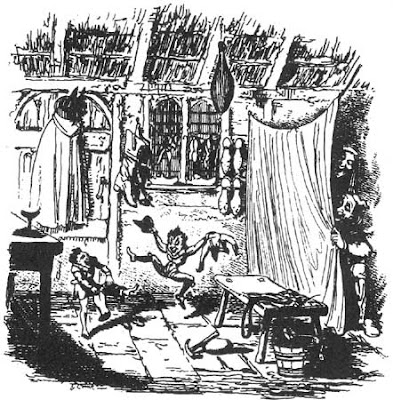 Three separate stories concerning the nature and goings-on among the elves of Grimmopolis.
Three separate stories concerning the nature and goings-on among the elves of Grimmopolis.
The first tale is that old chestnut, the shoemaker and the elves. You know the drill: shoemaker so poor that he only has enough leather for one pair of shoes, overnight the elves come in and use that leather to make a pair of shoes so snazzy that a buy pays double for them, thus allowing the shoemaker to purchase more leather, and the elves to compound the shoemaker's wealth, and so on. Curious to know how exactly this miracle continues the shoemaker and his wife stay up late and witness the naked elves--
Wait. Naked? I don't remember anything about naked elves?
So the shoemaker and his wife spend the next day making the elves cute little doll clothes, shirts and jackets and little tiny shoesies. That night the naked little elves come out and, whoa! clothes? Excited that they can finally go out in public the elves put on the clothes and take off, never to be seen again. The shoemaker was by this time very wealthy, his work beyond criticism, and he lived the remainder of his life coasting on the reputation of the elves. Second tale appears to be a Grimm version of Rip Van Winkle, only with a girl, and maybe a little more innocent. A poor servant girl gets an invitation from the elves to be a godmother at the christening of one of the elf children. Convinced by her employers that she should go (it might not be wise to piss off the elves) the girl is taken by the elves to a cave in the mountain. The christening party lasts three days and when she finally felt like it was time to leave the elves filled the girl's pockets with gold and lead her out of the mountain. Back at her employer's house she resumes her duties only to find that she had been gone for seven years, her employers long dead.
Second tale appears to be a Grimm version of Rip Van Winkle, only with a girl, and maybe a little more innocent. A poor servant girl gets an invitation from the elves to be a godmother at the christening of one of the elf children. Convinced by her employers that she should go (it might not be wise to piss off the elves) the girl is taken by the elves to a cave in the mountain. The christening party lasts three days and when she finally felt like it was time to leave the elves filled the girl's pockets with gold and lead her out of the mountain. Back at her employer's house she resumes her duties only to find that she had been gone for seven years, her employers long dead.
In the final tale we have a little elf mischief, which is easily undone if you know the secret to making a changeling laugh.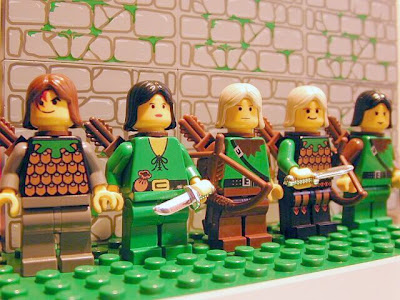 The elves swap out a newborn with a fat-headed changeling that does nothing but eat and drink. The mother goes to the neighbor who consulted the great book of changeling recipes and informed her that if you boil water in two eggshells it will make the creature laugh and he would lose his power. What that power is, we're never told or shown. So she boils water in the eggshells, the changeling laughs, and the elves return the correct child and go in search of another family to dump the fatheaded monster onto.
The elves swap out a newborn with a fat-headed changeling that does nothing but eat and drink. The mother goes to the neighbor who consulted the great book of changeling recipes and informed her that if you boil water in two eggshells it will make the creature laugh and he would lose his power. What that power is, we're never told or shown. So she boils water in the eggshells, the changeling laughs, and the elves return the correct child and go in search of another family to dump the fatheaded monster onto.
So let's recap some things we've learned about German elves:
- They are industrious enough to make shoes for humans to sell but lack either the ability, materials or wherewithal to make themselves clothes
- They think nothing of asking poor, illiterate humans to be their children's godparents and even less of the fact that in doing so they distort that human's entire sense of time and space.
- They love a good prank, swapping out people's children's with underworld changelings that can only be decommissioned by making them laugh at the sight of water boiling in eggshells.
And that Jolly Old Elf who pops around late in December.
Blog: The Excelsior File (Login to Add to MyJacketFlap)
JacketFlap tags: grimmoire, brothers grimm, Add a tag
 Or: How to become Pope in three easy lessons.
Or: How to become Pope in three easy lessons.
Our tale begins in Switzerland where we are told there was an old count who had an only son who was quite stupid. Believing that the best way to solve a problem is to throw money at it, and the best way to raise a child is to send it to boarding school, the old count sends his son away to the care of a famous master to see what can be done.
The boy returns a year later having learned how to understand the barking of dogs.
Despite this the father sends his son off to work with another master, in the hope that something might take. Another year passes and the boy returns having learned the language of the birds.
Gott in Himmel! the father laments. Is this boy hopeless? He sends him off for a third course at the feet of a master and this time, this time he comes back knowing the language of frogs. The father calls his men to have his useless son taken out to the woods and killed but his men are forgiving (they probably don't like their employer all that much anyway) and set the boy free, bringing back the eyes and tongue of a deer as "proof" of having killed the boy.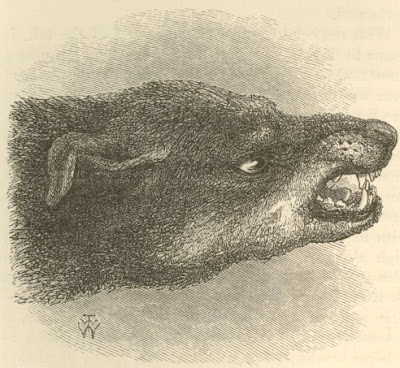 We now shift scenes and watch as the boy drifts across the countryside until he inquires about lodgings at a castle. The lord of the castle being no more reasonable than his father agrees to let the boy stay if he can stay the night in the old tower. The hitch? The tower is full of wild, snarling curs who have been known to devour human visitors. No sweat, replies talks-to-animals, just give me something to feed them and it'll all be jake. The lord agrees, the boy feeds the dogs, and instead of being eaten they tell of being under a curse to snarl and snap and protect the great treasure that is buried their. The lord, suddenly keen on the boy at the mention of the word treasure, agrees to adopt the boy as his own (no marriage necessary!) if he'll get the treasure. No sweat, the dogs help, the treasure is retrieved, the boy has a new father, happy ending.
We now shift scenes and watch as the boy drifts across the countryside until he inquires about lodgings at a castle. The lord of the castle being no more reasonable than his father agrees to let the boy stay if he can stay the night in the old tower. The hitch? The tower is full of wild, snarling curs who have been known to devour human visitors. No sweat, replies talks-to-animals, just give me something to feed them and it'll all be jake. The lord agrees, the boy feeds the dogs, and instead of being eaten they tell of being under a curse to snarl and snap and protect the great treasure that is buried their. The lord, suddenly keen on the boy at the mention of the word treasure, agrees to adopt the boy as his own (no marriage necessary!) if he'll get the treasure. No sweat, the dogs help, the treasure is retrieved, the boy has a new father, happy ending.
Not quite. After a while this idiot son-of-a-count decides he's going to take a trip to Rome. He's in the Alps, wants the traipse through the countryside, makes perfect sense. Along the way he hears the lamentation of the frogs. Oh! Do they have a story to tell, and it wears heavily upon the boy because he not only understands them but has learned that the pope has died. More, the cardinals have been waiting for a sign from heaven before anointing a new pope. Alas, the boy knows more than he shares, for when he appears at the Vatican two doves swoop down and land on his shoulders. A blessing from the lord! The cardinals have their sign and offer the boy a popeship. Undecided at first, feeling a bit unworthy, the doves persuade him to take the job and he agrees. He's anointed, consecrated, thus fulfilling the prophecy of the frogs he heard along the way. When it comes time for him to perform the mass the boy doesn't know the words but he doves are there to whisper in his ear (so in addition to speaking bird he can also understand when they speak Latin?) and all was good and right in the world.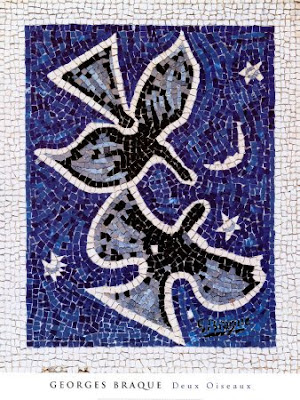 Wait. Is this a mocking of the Catholic church, that they would promote an idiot-heathen who speaks to the animals as their Holiness? Is this another version of the "be kind to idiots, for they shall have the Earth as their possession" kind of story that appears in every culture? Since he speaks to the animals and later becomes pope is this a folk version of the St. Francis story?
Wait. Is this a mocking of the Catholic church, that they would promote an idiot-heathen who speaks to the animals as their Holiness? Is this another version of the "be kind to idiots, for they shall have the Earth as their possession" kind of story that appears in every culture? Since he speaks to the animals and later becomes pope is this a folk version of the St. Francis story?
It's interesting that the tale has a classic three-act structure but that each act serves as its own mini story. It's also very tidy in it's knowledge gained, knowledge used balance and doesn't hint at just how far his knowledge will take him. Almost as if there was a mythical quality to the idea of being sent away to a "great master" (i.e. university) returns a child smarter than their parents who are too stupid to value the accomplishment. Perhaps the Grimm-era equivalent of telling kids that anyone can become president.
Or pope.
Blog: The Excelsior File (Login to Add to MyJacketFlap)
JacketFlap tags: grimmoire, brothers grimm, gretel, hansel, Add a tag
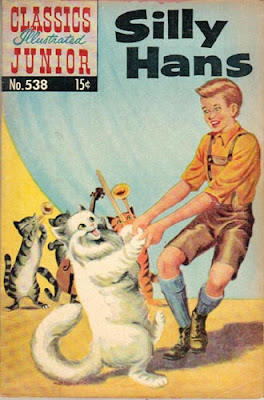 I'm digging "Clever Hans." There's something about the way it reads like bad drama and a repetitive nursery rhyme all at once.
I'm digging "Clever Hans." There's something about the way it reads like bad drama and a repetitive nursery rhyme all at once.
Hans and his mother have a series of conversations. They conversations are identical except for the lesson learned and the way it is applied the next time Hans goes out. Mama asks where Hans is going, he always replies "To Gretel's." She bids him to take care, he says good-bye. At Gretel's, after a cordial greeting she asks if he has anything for her. "Didn't bring anything. Want something from you," he says in his best clipped Bavarian.
And every time Gretel gives him something and sends him on his way.
Whatever Gretel gives him Hans mismanages. She gives him a needle, he stores it in a hay wagon. He tells his Mama and she tells him he's stupid, that he should have stuck it in his sleeve. "I'll do better next time," our Mama's boy says. But the next time Gtetel gives him a knife and he sticks that in his sleeve, like his Mama told him. And it continues, Mama pointing out what he should have done, Clever Hans following his mother's instructions the next visit despite the fact that the item changes and require different care and treatment. Gretel gives him a goat and he stuffs it in his pocket. She gives him bacon and he drags it home on a rope. She gives him a calf he wears it on his head.
Finally Gretel gives herself to bring home to his mother (more on this in a moment) allowing herself to be tied like an animal, taken to the barn and have grass thrown at her. When he reports this to his mother she once again admonishes his behavior, telling him he should thrown friendly looks at her. What does he do? He goes to the barn and cuts out all the eyes of the cows and sheep and throw them at her. Gretel has finally (!) had enough and leaves.
"And that was how Hans lost his bride."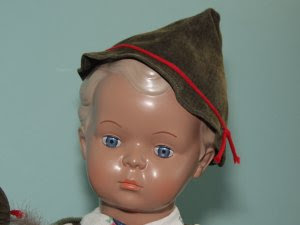 First, I love that this is 99% dialog. The repetition, the constant set-up and pay-off for each of Clever Hans' exchanges with Gretel has a feel of a campfire story, a very contemporary one at that. I also like that Hans (or Hansel) and Gretel seem to be archetypes of German boy and girl pairings, like Jack and Jill or Dick and Jane.
First, I love that this is 99% dialog. The repetition, the constant set-up and pay-off for each of Clever Hans' exchanges with Gretel has a feel of a campfire story, a very contemporary one at that. I also like that Hans (or Hansel) and Gretel seem to be archetypes of German boy and girl pairings, like Jack and Jill or Dick and Jane.
But here's a funny story about a thick-headed boy who is sent by his mother to court this girl and she is going along with it. Is Hans is the village idiot? Is Gretel getting something out of the arrangement far greater than a husband because she seems to put up with this fools behavior all the way to the very end? The girl always asks what he has for her and he's always empty handed, asking for something in return, and she gives him a trifle, a token, something designed to force his mother to send him back.
I really don't want to tread too far out on the ice on this one, but am I reading too much sexual tension in this story of expectation and unfulfilled desire? Everyone seems so keen on getting this dummer Kopf to give something to Gretel until finally, exasperated, she has Hans drag her home so that perhaps she can get some friction with the guidance of his mother. Even that sounds weirder than I'd intended, but there it is. And then you get the title: Clever Hans. Is it ironic, or is Hans playing the fool, refusing to take part in this arrangement? There's no mention of Gretel being beautiful or to his liking and perhaps Hans has no intention of giving in to the arrangement made between the girl and his mother. It would better explain why Gretel would put up with his foolishness if she was getting the better part of the deal, and why the mother would keep encouraging her boy despite his willful ignorance. Finally, his mother gives him the perfect out, to throw adoring eyes at her, and he performs his gross act in a masterstroke of deal-breaking. Being tied to a stable and having grass thrown at you might be a small price to pay, but then to witness the butchering of livestock and be pelted with their eyes, that'll send anyone running.
And then you get the title: Clever Hans. Is it ironic, or is Hans playing the fool, refusing to take part in this arrangement? There's no mention of Gretel being beautiful or to his liking and perhaps Hans has no intention of giving in to the arrangement made between the girl and his mother. It would better explain why Gretel would put up with his foolishness if she was getting the better part of the deal, and why the mother would keep encouraging her boy despite his willful ignorance. Finally, his mother gives him the perfect out, to throw adoring eyes at her, and he performs his gross act in a masterstroke of deal-breaking. Being tied to a stable and having grass thrown at you might be a small price to pay, but then to witness the butchering of livestock and be pelted with their eyes, that'll send anyone running.
Yeah, I could have dug this around the campfire when I was a Boy Scout. I don't know what that says about me, but there it is.
Blog: The Excelsior File (Login to Add to MyJacketFlap)
JacketFlap tags: grimmoire, brothers grimm, Add a tag
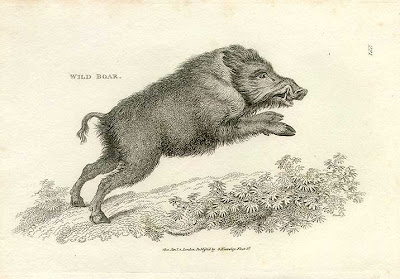 Beware! Wild boar!
Beware! Wild boar!
Yes, there's a wild boar menacing the people of the kingdom and whomever can catch or kill the dang thing will win the king's daughter for marriage.
The king's daughter, that would make her a princess, right? So in all these stories where you either have a princess in need of rescuing, or a princess as a prize, the notion that there is no greater hope for a girl than to be a princess must be fairly depressing for those girls in their little cottages hearing these stories. But to have no choice, to be married off to the first person that can kill a menacing boar, that must really chap their hides a bit. While I'm off on this tangent may I say that I think I'd like to see one of these stories where the prize of a princess is offered and a noblewoman goes off hunting and comes back to claim her reward. There had to be plucky lesbians in those days who wouldn't have minded a princess all their own. Let's have that story for once and lets see what sort of questions come up when we tell our little girls that version.
Meanwhile, back in the Grimmoire, a pair of brothers born to a poor man have taken it upon themselves to capture this deadly boar. The older brother is called cunning and claims to be doing it for pride. The younger brother is an innocent, off to kill the boar out of the goodness of his heart. Hmm, which brother seems most likely to win the girl in a Grimm story? All that's really up in the air is exactly how it's going to happen.
Like this: the younger brother befriends a dwarf in the forest who gives him a spear owing to the goodness of the boy's heart. The younger brother kills the boar and is on his way to claim his reward when he runs into his brother carousing in a bar. After hearing of his brother's accomplishment, and just to prove how cunning he is, he convinces to help his younger brother back to the castle. Yeah, help him by knocking him dead from behind, dumping him over the side of a bridge where and burying him in a shallow grave. Now that's what I call cunning!
Older brother returns with the boar, gets the girl, and when asked about the whereabouts of his brother says "I guess the boar got him before I got the boar." The end.No, wait! Many years pass and one day while a shepherd is driving his flock across the bridge he sees a bit of bone. His first thought is "My, that would make a good mouthpiece for my horn!" and so he takes the bone and carved it into a mouthpiece. His first attempt to blow some joyful noise breathes life into the bone, which recounts the tale of his horrible brother's deed. Startled by a magic horn, the shepherd takes it to the king, where it puts on a command performance. The king has the ground under the bridge dug up, finds the bones, and confronts his win-at-all-costs so-called-cunning son-in-law who does not deny what he did. The king has the older brother sewn into a sack and drowned while the bones of the younger brother are interned in the churchyard. The princess has no husband, the poor man lost two sons, the boar was killed, the only person who came out on top was the king. Oh, and that shepherd, who gave up tending his flock and now has his own touring show where he and the bone horn pack them in five nights a week with a matinee on Saturday.
(Okay, I made up that last part).
As a cautionary tale, this one almost goes the distance for me. I think the king should have been filled with some sort of remorse over marrying his daughter off to a killer, or at least had something more than a boar be the public nuisance. I guess from the old mythology dragons were downgraded to boars, but that aspect of the story is just a device to get into the brothers and the idea that justice prevails. It would obviously be a while before DNA testing would replace singing bones but the idea is the same, that somewhere along the way a bad deed reveals itself no matter how carefully tended the crime. The idea was (and is, I thought) to present deterrents to those who think themselves so smart they think they can get away with murder.
I'd still like to see at least one story where the princess has to marry a girl.
Blog: The Excelsior File (Login to Add to MyJacketFlap)
JacketFlap tags: wolf, cake, grimmoire, brothers grimm, torture, Add a tag
I'm starting to get deja vu. Not the pleasant kind of dejavu where I go Yeah, I remember this but the kind where I'm beginning to feel that story elements take on a mix-n-match approach. Take one girl, put her in a forest, have her meet a wolf...
Yes, this is Little Red Riding Hood. How she got her nickname is going to sound familiar to any parent: she loved her little hooded cape so much she'd wear it as often as she could. Boys get their lucky shirts and socks and whatnot that are essential for sports, girls like that one pair of jeans that they'll share with their friends four summers running, Red likes her hoodie.
No real revelations in the story itself this time, this chestnut's as old as they come. Innocent Red goes to granny's and the crafty wolf eats her just as he's already eaten her feeble old granny. The huntsman comes along, hears "granny" sleeping off her food coma, discovers it's the wolf and, well now, wait a minute. While the wolf sleeps he cuts open his belly and removes both granny and Red without waking him? He swallowed them whole? Then they fill his belly with heavy rocks and sew him back up? And he wakes up, goes into shock and dies then? Sounds a bit like those urban legends about people who wake up in their bathtubs with a note and a cell phone telling them they have half an hour to call 911 because their kidneys have been kidnapped. I know I've read this about the belly being refilled with rocks before and it strikes me as both cruel and unusual punishment. What is the logic or reasoning behind not just killing the animal up front and releasing the prisoners within, why go through all that just to let the animal die with the shock and recognition? It isn't like they need to interrogate the wolf for information vital to national security (thus justifying their torture).
Sounds a bit like those urban legends about people who wake up in their bathtubs with a note and a cell phone telling them they have half an hour to call 911 because their kidneys have been kidnapped. I know I've read this about the belly being refilled with rocks before and it strikes me as both cruel and unusual punishment. What is the logic or reasoning behind not just killing the animal up front and releasing the prisoners within, why go through all that just to let the animal die with the shock and recognition? It isn't like they need to interrogate the wolf for information vital to national security (thus justifying their torture).
Interestingly, the story doesn't end there. The Grimm's continue with "There is also another tale..." where Red is on her way to granny's again, but this time she is all the wiser. She sees the wolf and races ahead to warn granny. This other wolf, older and craftier, waits on the roof of granny's house to pounce on the occupants when they come out. Granny suggests Red take the water that the evening's sausages were cooked in and dump it in the water trough outside. Unable to resist the smell the wolf edges toward the roof, slips and falls into the trough where he breaks his neck and dies. It's a pretty lame coda, and no wonder that version isn't generally known.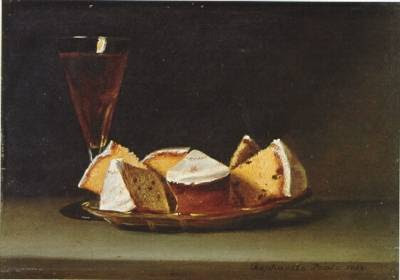 The one little detail that I like in all of this is that whenever granny is sick her daughter sends Red to visit with some cake and wine as medicine. I have long thought that sometimes the best way to cure a sick body was to shock the immune system into reacting. Everything we do -- drink plenty of fluids to hydrate and flush the system, alternately feed and starve the fever, vitamins and medicines -- all seems like closing the barn door after the fact. If a person has the stomach for it, why not a nice rich cake and some vino. It's medicinal properties can be argued, but making the sick person comfortable with food can't hurt the psyche. I'm not going to change any science with this thinking, but I honestly don't think it could hurt to try.
The one little detail that I like in all of this is that whenever granny is sick her daughter sends Red to visit with some cake and wine as medicine. I have long thought that sometimes the best way to cure a sick body was to shock the immune system into reacting. Everything we do -- drink plenty of fluids to hydrate and flush the system, alternately feed and starve the fever, vitamins and medicines -- all seems like closing the barn door after the fact. If a person has the stomach for it, why not a nice rich cake and some vino. It's medicinal properties can be argued, but making the sick person comfortable with food can't hurt the psyche. I'm not going to change any science with this thinking, but I honestly don't think it could hurt to try.
Blog: The Excelsior File (Login to Add to MyJacketFlap)
JacketFlap tags: mythology, grimmoire, brothers grimm, greek, Add a tag
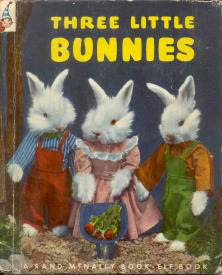 This one is so choc-a-block with stuff I'm almost at a loss for where to begin.
This one is so choc-a-block with stuff I'm almost at a loss for where to begin.
We start well enough in familiar Grimm territory with a king whose superstitious of omens and a separate prophecy to a family that their son who was born with a caul will marry the king's daughter by the age of fourteen. The king, traveling through the village in disguise (because most people in the villages never saw their kings up close back then anyway) hears about the caul and the prophecy and becomes determined to prevent the prophecy from happening.
Silly king, do you not know the story of Oedipus?
Clearly he doesn't because he offers the boy's parents a metric tonne of geld for the boy, promising him the care they couldn't possibly give him due to their poverty. Typical politician, always throwing money at the problems of the poor rather than examining the root cause. Anyway, he gets the boy, lays him in a small box and sends him down the river in the box not realizing it was like sending off lifeboat number six from the Titanic. Downstream the box coasts to the collection pool of a mill where a man thinks he's found riches. Nope, only a child, but Mr and Mrs. Miller don't have a child so the man gives it to them as a gift, for which they are grateful. From there the Millers raise the boy good and honest and virtuous.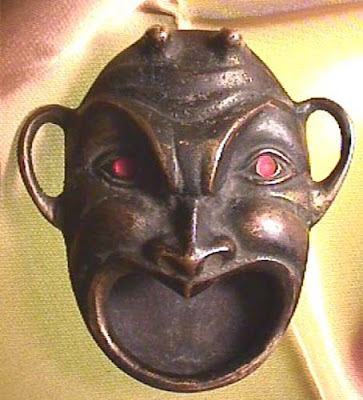 Fourteen years later and the king is off on business but caught in a thunderstorm he takes shelter with the Millers. My, what a fine boy you have, the king notes. Yup, say the Millers, floated down the river right into our hearts about fourteen years ago. The king puts 2 and 2 together and realizes this was his doing. Thinking quickly the king pulls a trick he learned from Hamlet and sends the boy back to the castle with a message to the queen that says "have this boy killed before I return home."
Fourteen years later and the king is off on business but caught in a thunderstorm he takes shelter with the Millers. My, what a fine boy you have, the king notes. Yup, say the Millers, floated down the river right into our hearts about fourteen years ago. The king puts 2 and 2 together and realizes this was his doing. Thinking quickly the king pulls a trick he learned from Hamlet and sends the boy back to the castle with a message to the queen that says "have this boy killed before I return home."
But it's still tunderstorming and the boy is making bad time so he stops at a cottage and asks if he can stay the night. I want to pause for a moment to consider this point because it appears a bit in these older stories and it brings up an interesting idea about what life used to be like. Imagine, it's raining, or you're lost, and you see a house and you approach and ask if you can spend the night. People always have their reasons for acting put-out by the intrusion (unless they're magical trolls) but in the end their reasons are never enough to prevent them from performing acts of pure kindness. Could you imagine trying to pull something like that today? How small a community do you think you'd have to find before you'd stumble onto that kind of kindness today?
So, anyway, the woman in the cottage tells the boy that he's made a bad call because the cottage belongs to some robbers who will, when they come home, quick-as-winking chop him into beefsteak tartar. He doesn't care, he's tired, and he'll take his chances. He falls asleep on the bench and it's a deep sleep because he never hears the robbers come home, doesn't hear the conversation they have with the old woman. The robbers open the king's letter, see what it says, tear it up, and write a new letter informing the queen that she is to marry the boy to their daughter.
Okay, in case anyone was worried about my Oedipus reference at the beginning, no, he doesn't end up marrying his mother, nor does anyone pull their eyes out. The king will get his, but not just yet. Some riddles to solve, but no Sphinx, and they're not as fun.
The queen marries off her daughter to the boy and the king comes home, stunned and horrified. In order to remain married to the princess the king orders the boy to go to hell (literally) and fetch three golden hairs off the head of the devil (Hmmm, a lot of hair in these stories). No sweat, says the boy, and off he goes. What's that sound, like a generator on high? Oh, it's Homer spinning in his grave.
The road to hell may or may not be paved, but there are at least three checkpoints along the way. Because three, it's a magic number. First stop is a gated city where the gatekeeper asks the boy his trade and what he knows. "I know everything," the boy says, as only a fourteen year old could say with any sort of conviction. The gatekeeper mentions that the fountain in town used to flow endlessly with wine but now it's all dried up, why is that boy-who-knows-everything? "I'll tell you on my way back," the boy says, using the oldest bluff in the book. And so he gets a pass. Second city, same situation, only the problem here is the city's magic tree that bears golden fruit. The boy plies the same bluff and presses on. The third stop isn't a city, but a river, with a boatman. The boatman wants to know why he has to spend the rest of eternity ferrying people back and forth across the river which, standing between the boy and the devil makes it the River Styx, or Sanzu, or maybe the Rasa. The boy promises and answer on his return and is ferried.
Second city, same situation, only the problem here is the city's magic tree that bears golden fruit. The boy plies the same bluff and presses on. The third stop isn't a city, but a river, with a boatman. The boatman wants to know why he has to spend the rest of eternity ferrying people back and forth across the river which, standing between the boy and the devil makes it the River Styx, or Sanzu, or maybe the Rasa. The boy promises and answer on his return and is ferried.
Reaching the gate of hell we get a description of it being dark and sooty and the devil's not home. But his grandmother's home.
Yes, the devil has a grandmother. Doesn't that just totally tear apart any other concept of who and what the devil is or where he came from? I mean, this just makes the gyroscope in my head go off kilter a bit.
The boy explains his story to the devil's grandmother and she turns him into an ant, to hide in the fold of her clothes, while she helps extract the hairs and answer the riddles. Now, see, the devil's grandmother isn't so bad, she actually wants to help the boy! So the devil comes home and he's basically a giant with a bad temper. He goes all "fee fi fo fum" because he smells a human and his grossemuti says I just cleaned this place and you're tearing it up! You're always smelling humans... just a total grouch.
Soon the devil fall asleep with his head in her lap and she yanks a hair from his hair. When he wakes she says it was dream that caused her to pull his hair, something about a dried up fountain. The devil explains that he's got a toad under a stone in the fountain blocking the flow. Again he falls asleep, and she tugs, this time she says she dreamt of a tree that stopped growing apples. The devil chortles and says, yes, there's a mouse at the root of the tree that will kill the tree if it isn't removed soon. One more time, one more hair, and this time the dream is about the boatman. The devil explains that all the boatman has to do is hand off his pole into some unsuspecting traveler's hand and he's free of his servitude. Three hairs, three mysteries solved, the devil's witchy grandmother returns the boy to his non-ant form and sends him back home.
He relates what he has learned to the boatman (after crossing back!) and the gatekeepers, thus keeping his word, and for his troubles is given four donkey loads of gold (which are big ass loads) to bring home with him. In the boy's triumphant return the king finally gives up, but he's curious to know where the gold came from because, as we have learned, the opposite of a kind king is a greedy one. The boy tells him the gold is lying on the shores across the river leading to hell. Too good to be true, the king sets off to claim all the goad he can eat, but when he reaches the river the boatman hands off his pole to the king and runs free.
"Is he still ferrying?"
"Why, of course. Do you think someone's about to take the pole away from him?"
See, I promised you the king wouldn't die, but he got his nonetheless.
Blog: The Excelsior File (Login to Add to MyJacketFlap)
JacketFlap tags: grimmoire, brothers grimm, fable, Add a tag
What's not to like about animals and inanimate objects setting up house together?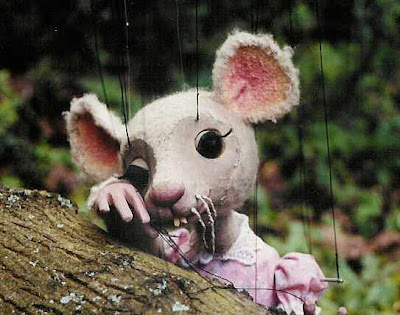 This is one of those stories where the members of the house trade jobs and find they never really appreciated what the others did. Only instead of a farmer and his wife (as in Wanda Gag's Gone is Gone, among others) we have a Mouse, a Bird and a Sausage. Bird's job was to bring back wood for the fire, Mouse ported water back to their home and Sausage did the cooking.
This is one of those stories where the members of the house trade jobs and find they never really appreciated what the others did. Only instead of a farmer and his wife (as in Wanda Gag's Gone is Gone, among others) we have a Mouse, a Bird and a Sausage. Bird's job was to bring back wood for the fire, Mouse ported water back to their home and Sausage did the cooking.
Only the logic of a fairy tale would allow a sausage to slide through the stew just before mealtime to make sure everything was salted and seasoned. And exactly how long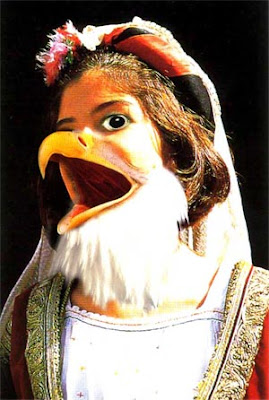 could a sausage be called on to flavor a meal before it was little more than flavorless meat in a casing?
could a sausage be called on to flavor a meal before it was little more than flavorless meat in a casing?
After a trade of duties Sausage goes off to fetch firewood but is eating by a passing dog. When Sausage doesn't return from his chore Bird fetches the firewood, found out the dog ate her housemate, and flew back to tell Mouse. Distressed the attempt to carry on, Mouse tending the cooking. Just before serving Mouse slips into the pot to season the meal but never slips out, having become one with the stew. Bird didn't see this, and distracted at having lost two friends, inadvertently sets the house on fire. Going to fetch water Bird is dragged down the well with the bucket and drowns.
housemate, and flew back to tell Mouse. Distressed the attempt to carry on, Mouse tending the cooking. Just before serving Mouse slips into the pot to season the meal but never slips out, having become one with the stew. Bird didn't see this, and distracted at having lost two friends, inadvertently sets the house on fire. Going to fetch water Bird is dragged down the well with the bucket and drowns.
There's your cheery bedtime story, kiddies. Now sleep tight.
Blog: The Excelsior File (Login to Add to MyJacketFlap)
JacketFlap tags: cinderella, grimmoire, brothers grimm, Add a tag
 Most decidedly not the Disney version.
Most decidedly not the Disney version.
No fairy godmother.
No pumpkins, no coaches, no mice.
The ball was a three-night gala.
No clock chiming at midnight.
The glass slipper was made of gold.
Cinderella's step-sisters each cut off parts of their feet in order to fit the slipper.
All these things that just get left behind in all the retellings, all this wonderful and weird and rich detail!
I cannot tell you how many times a week I see girls go straight to the princess books, many of them are under the age of five, all of them able to name the Disney princesses on sight. I think there ought to be a law that says you cannot buy young girls any books about princesses until after you've read the source material to them. Aloud. Fully explained.
Yes, tell them that when her rich father went on a trip that his stepdaughters requested he bring them back pearls and dresses but that Cinderella requested only a twig from a far-away tree that she would plant on her dead mother's grave where it will grow into a tree (explain how roots work, dearies) and how the tree grew and housed a bird that granted her wishes and prayers.
Read these small girls the story and point out that her father is rich -- she didn't need to dress in rags -- and that her self-sacrifices and obedience to her stepmother and stepsisters are what gave her strength of character. Remind them of these traits when these little princesses throw tantrums because their mothers will only buy them one or two princess books and not all of them. Point out that Cinderella only became a princess after a lengthy indentured servitude with a cruel stepmother who would make her pick out lentils thrown into the ashes of the fireplace. Maybe suggest that if these little princesses would like some more princess books they could volunteer to pick out a bowl of lentils themselves so that they know what it means to become a princess. And here's a nice detail: In order to prevent Cinderella from running away after the third night of the gala festivities he has his servants coat the stairs with tar. This is how she loses her gold (not glass) slipper. Be sure to pause thoughtfully when relating the part about the stepsisters chopping off parts of their feet to fit the slipper they know isn't theirs. And for their wickedness and malice these stepsisters have their eyes pecked out by pigeons before and after the wedding ceremony.
And here's a nice detail: In order to prevent Cinderella from running away after the third night of the gala festivities he has his servants coat the stairs with tar. This is how she loses her gold (not glass) slipper. Be sure to pause thoughtfully when relating the part about the stepsisters chopping off parts of their feet to fit the slipper they know isn't theirs. And for their wickedness and malice these stepsisters have their eyes pecked out by pigeons before and after the wedding ceremony.
Underscoring the ghastly behavior of the stepsisters equal to the story of Cinderella herself. Cinderella cannot be who she is (or becomes) without the adversity presented to her, and it is her reward, her cosmic justice if you will, that she not only gets the prince but that her sisters are deformed and mutilated for their actions without her wishing it upon them. These are not small lessons and if all a girl knows is that Cinder's stepsisters were ugly brats then there is little to learn from the tale other than "in the end she gets to wear pretty clothes all the time and dance" as one little girl I heard summarized it.
Yeah, that's what that story is all about.
Blog: The Excelsior File (Login to Add to MyJacketFlap)
JacketFlap tags: fish, grimmoire, brothers grimm, fisherman, Add a tag
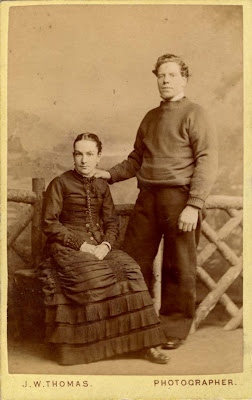 Another classic tale, another Grimm story first introduced to me via the magic of the "Fractured Fairy Tales" feature on the Rocky and Bullwinkle program.
Another classic tale, another Grimm story first introduced to me via the magic of the "Fractured Fairy Tales" feature on the Rocky and Bullwinkle program.
I'm sure the memory I have of it being three wishes instead of the six demands the wife makes comes from that cartoon's warped telescoping of the story, but the odd little message at the end of the Grimm version gives pause.
To recap: Fisherman finds an enchanted flounder who once was a prince in the sea. Or was he a talking flounder who was once an enchanted prince? Either way, he's a flounder, a prince, he talks, and he's enchanted. Makes me wonder about his backstory, but maybe we'll get to that tale in time. Fisherman sets the flounder free then tells his wife who upbraids him for not knowing the rules of Fairytale Land and insists he go back and demand his reward. Oh, and in case we weren't clued in that she married a dullard, wifey tells him what to ask for: a better cottage to live in. He does, and he does, returns home to find the wish granted, but it's not enough. Now she wants a castle so the fisherman returns and makes another request on behalf of his wife, and then another. After the castle she wants to be king (Not queen? Hmmm.), and after she's queen she wants to be emperor (really?) and then she wants to be pope (Pope Joan, perhaps?) finally to be like a god.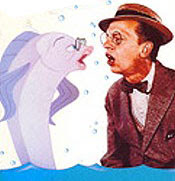 Like a god. Not god, but an incredible simulation.
Like a god. Not god, but an incredible simulation.
This is not insignificant, because what the flounder says in the end is Go back home. She's sitting in your hovel again. For a woman who wasn't satisfied with fine homes and refined titles she got a little lesson in happiness; she and her fisherman husband aren't punished though they may believe they have been. The flounder has shown them the way of the Buddha, to live simply and humbly and not want beyond their needs. That the story is about a fisherman carries its own religious symbology and that he asks for nothing himself underscores that because the wife demanded the granting of wishes that she was in need of the lesson, which the wise, enchanted prince of a flounder was more than willing to provide.
I must confess, one of the things that comes to mind with this story is the Hope-Crosby vehicle The Road to Utopia. There's a scene where the boys are ice fishing and Bing keeps pulling out fish after fish while Bob gets nothing. After Bing leaves Bob looks down and there's a fish looking up out of the hole. Fish: Hey, where'd your buddy go? Bob: Oh, he just took off with Dorothy. Fish: Well, tell him number sixteen was here. Bob double-takes. The fish slips away. I love just love talking animals, they always seem to be smarter than humans, even when they seem to be throwing their own lives away in the process. At least in this Grimm tale the fish stays a fish and lives.
Blog: The Excelsior File (Login to Add to MyJacketFlap)
JacketFlap tags: grimmoire, brothers grimm, Add a tag
 Once upon a time there was a poor man who could no longer provide enough food for his only son...
Once upon a time there was a poor man who could no longer provide enough food for his only son...
Yes, more famine. Only this time the boy goes out into the world on his own so as not to be a burden. But let's leave this part of the story aside for this next little juicy tidbit:
The king had a daughter who was very beautiful but also very strange, for she had made a vow that she would accept as her lord and master only a man who would let himself be buried alive with her if she should die first.Very strange indeed.
The lesson is going to fall to the king's daughter because obviously the boy is going to meet her, get buried with her alive, and somehow survive to show that such unusual and cruel demands are met with a fitting rejoinder. Yes, the boy agrees, and the princess dies, and it's while entombed that the boy sees a snake. He cuts the snake to pieces only to be amazed when another snake comes and lays three leaves on the chopped up snake to heal it and bring it back to life. The boy takes the leaves and revives his wife and -- huzzah! -- she is alive and they are released from the tomb!
And how does she repay her hubby? Well, one day they are on a voyage and she becomes enamored with the ship's captain. But what's to stop her from killing her faithful hubby and tossing him into the sea? Nothing, but the boy/husband's servant has the ability to go overboard and save him, reviving him with those snake leaves. And then they row ashore and tell the king, the strange princess's father. He cannot believe such a thing and hides his son-in-law when the princess returns.
 She tells such a tale of woe, about how her husband died at sea, and has as her witness the ship's captain. King Daddy asks why she did not honor her husband the way he honored her and thrown herself overboard and then -- oops -- out pops her restored hubby.
She tells such a tale of woe, about how her husband died at sea, and has as her witness the ship's captain. King Daddy asks why she did not honor her husband the way he honored her and thrown herself overboard and then -- oops -- out pops her restored hubby.Dad's decision is swift: she and the ship captain must sail out to sea in a boat with holes drilled into it. A long, slow, sinking death at sea, lots of time to contemplate how she ended up in that predicament and no way out.
Despite the eye-for-an-eye ending on this, I do find myself liking this tale because it speaks directly to the idea of children being demanding, ungrateful and cruel and calls them to task for it. Indulgent parents don't come off smelling so sweet either when you think of it. I come and go with my feelings about morals in fables but something about this one feels contemporary.
Blog: The Excelsior File (Login to Add to MyJacketFlap)
JacketFlap tags: punch and judy, grimmoire, brothers grimm, witches, Add a tag
 Whenever you reread a familiar story it's the details that tend to stand out. On first brush the details are part of the fabric of the whole, the bits and pieces you put together to make a whole image in your head. Later you see that the things you forgot add an interesting flavor to the memories.
Whenever you reread a familiar story it's the details that tend to stand out. On first brush the details are part of the fabric of the whole, the bits and pieces you put together to make a whole image in your head. Later you see that the things you forgot add an interesting flavor to the memories.
Famine would have been a very realy fear for people and here runs front and center. Famine has forced Hansel and Gretel's parents to a drastic plan: lead the children into the woods and ditch them. Of course, whenever parents consider such dastardly things it means one parent is a step-parent. Guess which, or should I say witch because by now we know that step-mothers are secretly witches (but not true witches as we'll see).
Having heard the plan the children decide they will find a way home. Hansel leaves small pebbles along the road the first time and the parents (well, the step-witch at least) is dismayed at their return. Second time's the charm as they lead the children deeper into the woods and Hansel switches to bread which is eaten by birds. Now truly lost in the woods they stumble upon a house made of bread and cake with sugar glass for windows. Nibble-nibble-nibble and out pops a true witch. How do we know? Because
...witches have red eyes and can't see very far, but they have a keen sense of smell, like animals, and can detect when human beings are near them.which sounds an awful lot like an albino to me. Seems folk in those days were fearful of things they didn't understand and woe to any child born to be labeled a witch. (And for a more detailed look at the idea behind while albinos are cast as villians in popular culture, check out this article fromPenn State.)
 So this particular witch was smart enough to know that during a famine people would be shoving their children into the woods the way some people flush goldfish down the toilet when they tire of them. And she had the resources (being a witch, no doubt, she could conjure them) to build edible houses much like the gingerbread treats children can't resist during the holiday season.
So this particular witch was smart enough to know that during a famine people would be shoving their children into the woods the way some people flush goldfish down the toilet when they tire of them. And she had the resources (being a witch, no doubt, she could conjure them) to build edible houses much like the gingerbread treats children can't resist during the holiday season.Once lured to the house the witch throws Hansel into a pen for fattening while Gretel has to help with the household duties. The detail here that gets me is that while Hansel feasts and seems unable to use his strength to break out Gretel is fed crab shells. Crab shells. In the middle of the forest. Crab.
How Gretel fools the witch and gains her freedom owes much to the old Punch and Judy plays (that were themselves adapted from the humorous bits of lazzi performed by harlequin, or Arlequino, in 17th century Comedia del Arte). To fool the Hangman, Punch pretends not to understand what he's supposed to do. The Hangman informs him to stick his head in the noose but Punch can't seem to manage until out of frustration the Hangman sticks his head in the noose where Punch kicks the box out from under him and cheats death. Here, Gretel is asking the witch for a demonstration on how Hansel is going into the oven until the witch finally shows here to where Gretel can shove her in and bake her.
 The witch dead, Hansel and Gretel ransack the witches house of gems and jewels, find their way home, and return home to their joyful father who, once again, is a widower since the step-mother died.
The witch dead, Hansel and Gretel ransack the witches house of gems and jewels, find their way home, and return home to their joyful father who, once again, is a widower since the step-mother died.As a reminder that the Grimm tales came from the oral tradition this one ends with the storyteller's little tag:
My tale is done. See the mouse run. Catch it, whoever can, and then you can make a great big cap out of it's fur.Not quite Hickory Dickory Dock, but about as meaningful.



They are gorgious! All of them! But the pig – such a sweet smile :)
Lovely as always! I especially like the bear, penguin and elephant.
Beautiful! My favorites are the cat and the penguin.
~Gina
Each one has so much personality! I get the sense that their cards aren't going to be able to hold them in any longer. Well done. kt
That's the best penguin ever!
Sweet..Adorable..and Fun!!
Beautiful, Irisz! Every one of them!
Very beautiful.
Greetz from Holland
I'm glad that you like it, and most of you have favorite characters!
Thanks a lot!!
Wooo! I would love to have one! Its adorable. :)))
love them all!!!
http://1girlshow.blogspot.com
very cute, my favourite is Mr. Pig, but Mr. Elephant too ... and M...